Contemporary Issues Reflection: ICT in the Tourism Industry
VerifiedAdded on 2020/11/23
|6
|1331
|124
Report
AI Summary
This report provides a reflection on the application of Information and Communication Technology (ICT) within the tourism industry. The student analyzes the impact of ICT, including e-tourism, e-travel agencies, and social media platforms, on the growth, development, and consumer behavior in the industry. The report discusses both positive effects, such as increased consumer attraction and sales, and negative effects, such as potential employment issues and the displacement of traditional travel agents. The student uses the Gibbs model to analyze these issues, evaluating the impact of ICT on consumer management and supply chain management. The report concludes that ICT has a positive overall impact on the tourism industry, enhancing efficiency, market share, and brand image, while also acknowledging the need for adaptation to technological changes and the importance of maintaining consumer trust. The student also reflects on their own presentation skills and team collaboration.
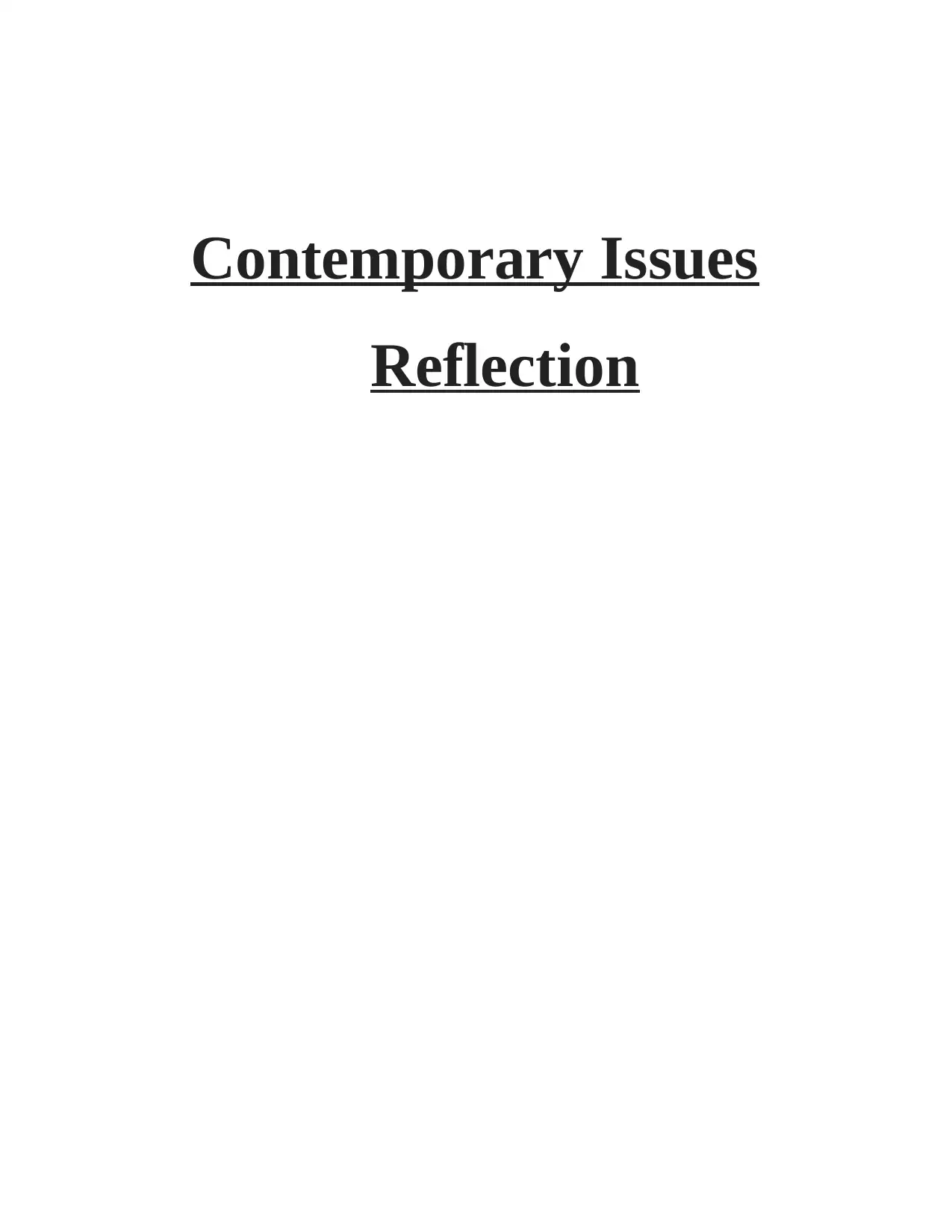
Contemporary Issues
Reflection
Reflection
Paraphrase This Document
Need a fresh take? Get an instant paraphrase of this document with our AI Paraphraser
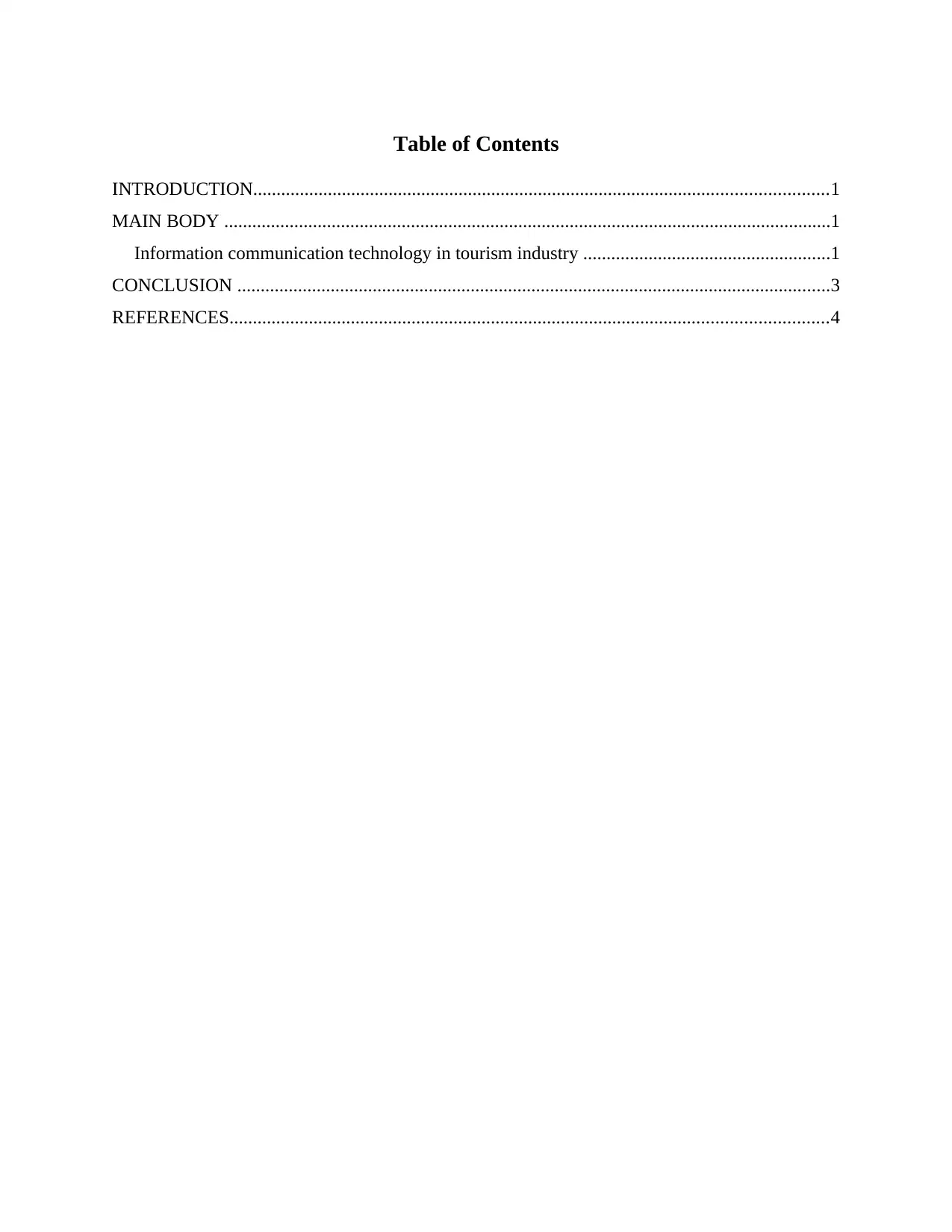
Table of Contents
INTRODUCTION...........................................................................................................................1
MAIN BODY ..................................................................................................................................1
Information communication technology in tourism industry .....................................................1
CONCLUSION ...............................................................................................................................3
REFERENCES................................................................................................................................4
INTRODUCTION...........................................................................................................................1
MAIN BODY ..................................................................................................................................1
Information communication technology in tourism industry .....................................................1
CONCLUSION ...............................................................................................................................3
REFERENCES................................................................................................................................4
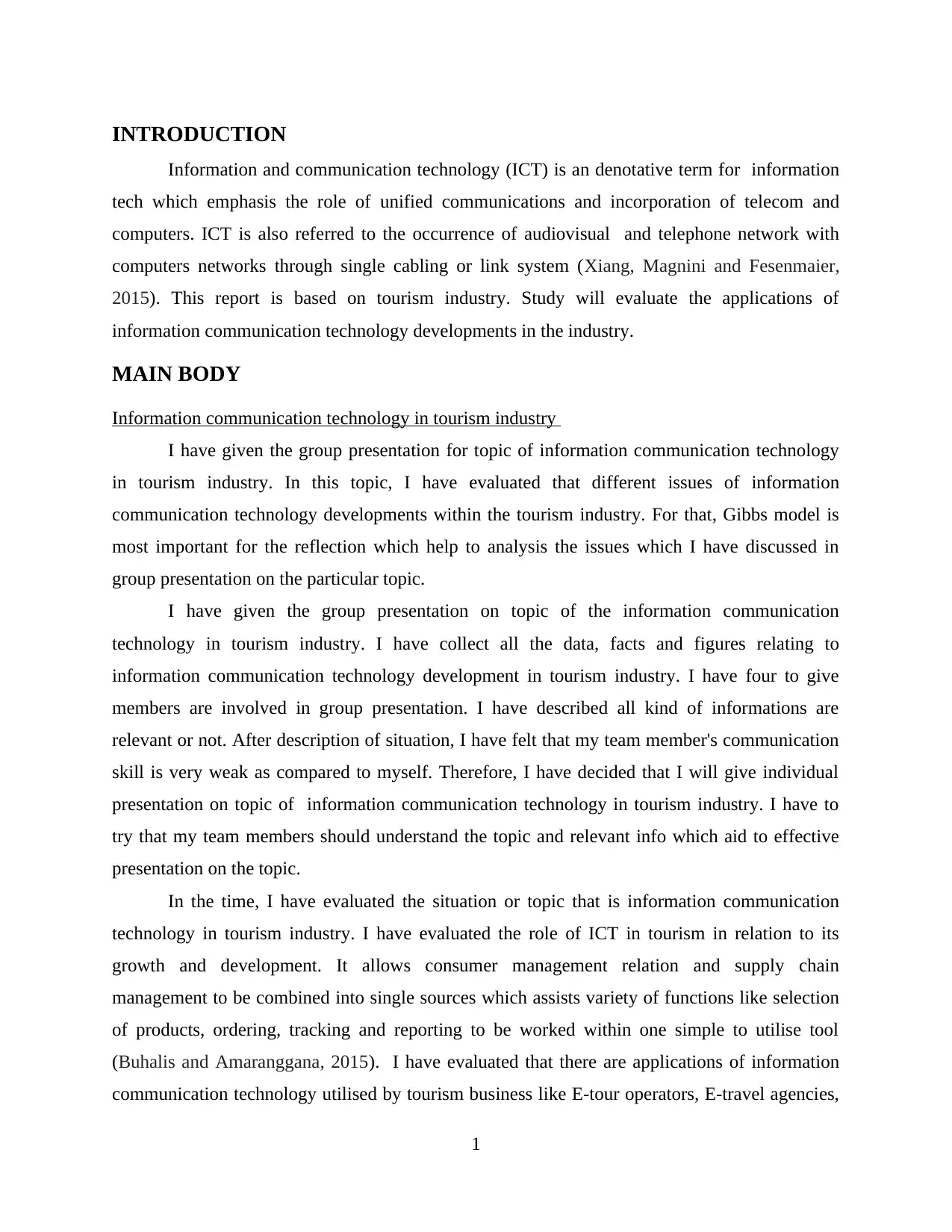
INTRODUCTION
Information and communication technology (ICT) is an denotative term for information
tech which emphasis the role of unified communications and incorporation of telecom and
computers. ICT is also referred to the occurrence of audiovisual and telephone network with
computers networks through single cabling or link system (Xiang, Magnini and Fesenmaier,
2015). This report is based on tourism industry. Study will evaluate the applications of
information communication technology developments in the industry.
MAIN BODY
Information communication technology in tourism industry
I have given the group presentation for topic of information communication technology
in tourism industry. In this topic, I have evaluated that different issues of information
communication technology developments within the tourism industry. For that, Gibbs model is
most important for the reflection which help to analysis the issues which I have discussed in
group presentation on the particular topic.
I have given the group presentation on topic of the information communication
technology in tourism industry. I have collect all the data, facts and figures relating to
information communication technology development in tourism industry. I have four to give
members are involved in group presentation. I have described all kind of informations are
relevant or not. After description of situation, I have felt that my team member's communication
skill is very weak as compared to myself. Therefore, I have decided that I will give individual
presentation on topic of information communication technology in tourism industry. I have to
try that my team members should understand the topic and relevant info which aid to effective
presentation on the topic.
In the time, I have evaluated the situation or topic that is information communication
technology in tourism industry. I have evaluated the role of ICT in tourism in relation to its
growth and development. It allows consumer management relation and supply chain
management to be combined into single sources which assists variety of functions like selection
of products, ordering, tracking and reporting to be worked within one simple to utilise tool
(Buhalis and Amaranggana, 2015). I have evaluated that there are applications of information
communication technology utilised by tourism business like E-tour operators, E-travel agencies,
1
Information and communication technology (ICT) is an denotative term for information
tech which emphasis the role of unified communications and incorporation of telecom and
computers. ICT is also referred to the occurrence of audiovisual and telephone network with
computers networks through single cabling or link system (Xiang, Magnini and Fesenmaier,
2015). This report is based on tourism industry. Study will evaluate the applications of
information communication technology developments in the industry.
MAIN BODY
Information communication technology in tourism industry
I have given the group presentation for topic of information communication technology
in tourism industry. In this topic, I have evaluated that different issues of information
communication technology developments within the tourism industry. For that, Gibbs model is
most important for the reflection which help to analysis the issues which I have discussed in
group presentation on the particular topic.
I have given the group presentation on topic of the information communication
technology in tourism industry. I have collect all the data, facts and figures relating to
information communication technology development in tourism industry. I have four to give
members are involved in group presentation. I have described all kind of informations are
relevant or not. After description of situation, I have felt that my team member's communication
skill is very weak as compared to myself. Therefore, I have decided that I will give individual
presentation on topic of information communication technology in tourism industry. I have to
try that my team members should understand the topic and relevant info which aid to effective
presentation on the topic.
In the time, I have evaluated the situation or topic that is information communication
technology in tourism industry. I have evaluated the role of ICT in tourism in relation to its
growth and development. It allows consumer management relation and supply chain
management to be combined into single sources which assists variety of functions like selection
of products, ordering, tracking and reporting to be worked within one simple to utilise tool
(Buhalis and Amaranggana, 2015). I have evaluated that there are applications of information
communication technology utilised by tourism business like E-tour operators, E-travel agencies,
1
⊘ This is a preview!⊘
Do you want full access?
Subscribe today to unlock all pages.

Trusted by 1+ million students worldwide
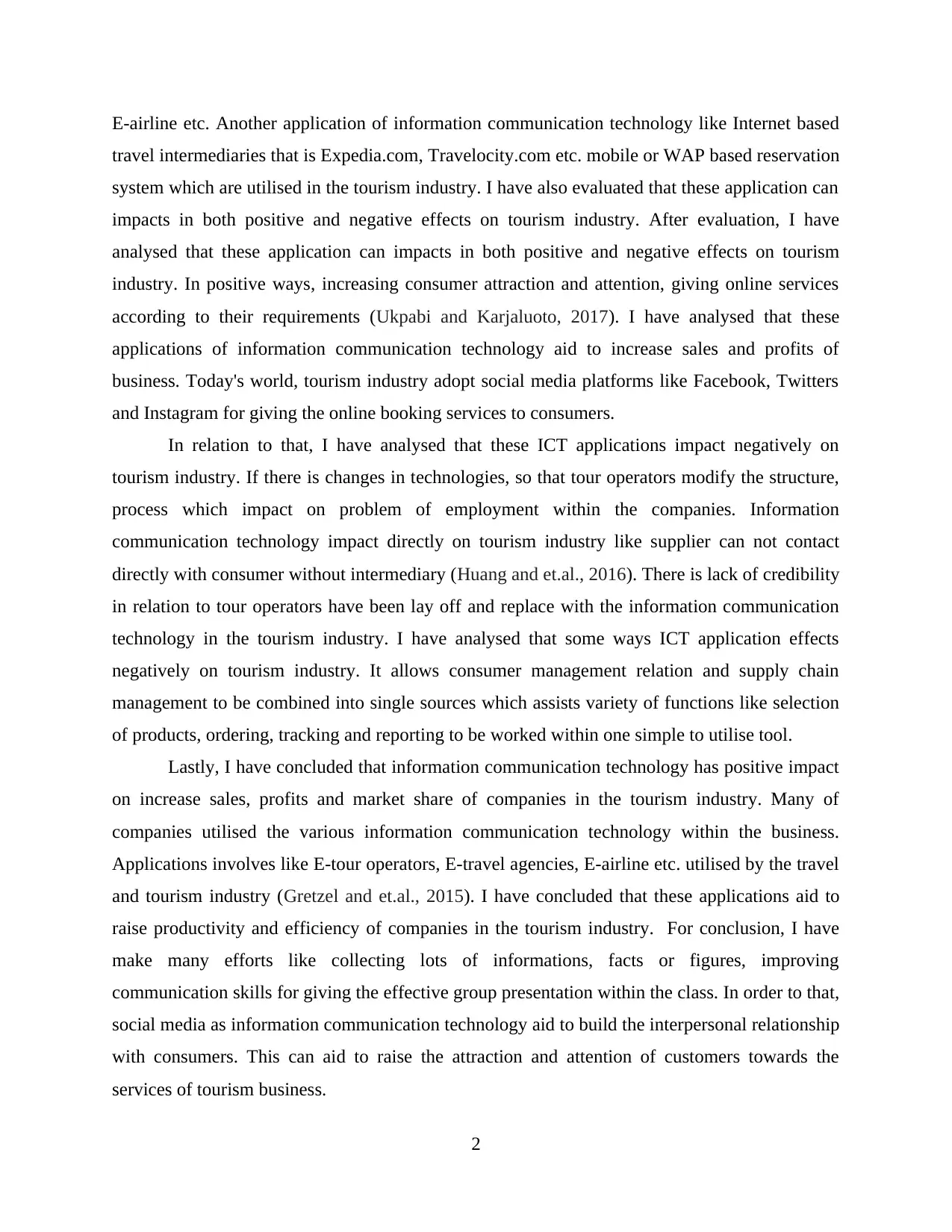
E-airline etc. Another application of information communication technology like Internet based
travel intermediaries that is Expedia.com, Travelocity.com etc. mobile or WAP based reservation
system which are utilised in the tourism industry. I have also evaluated that these application can
impacts in both positive and negative effects on tourism industry. After evaluation, I have
analysed that these application can impacts in both positive and negative effects on tourism
industry. In positive ways, increasing consumer attraction and attention, giving online services
according to their requirements (Ukpabi and Karjaluoto, 2017). I have analysed that these
applications of information communication technology aid to increase sales and profits of
business. Today's world, tourism industry adopt social media platforms like Facebook, Twitters
and Instagram for giving the online booking services to consumers.
In relation to that, I have analysed that these ICT applications impact negatively on
tourism industry. If there is changes in technologies, so that tour operators modify the structure,
process which impact on problem of employment within the companies. Information
communication technology impact directly on tourism industry like supplier can not contact
directly with consumer without intermediary (Huang and et.al., 2016). There is lack of credibility
in relation to tour operators have been lay off and replace with the information communication
technology in the tourism industry. I have analysed that some ways ICT application effects
negatively on tourism industry. It allows consumer management relation and supply chain
management to be combined into single sources which assists variety of functions like selection
of products, ordering, tracking and reporting to be worked within one simple to utilise tool.
Lastly, I have concluded that information communication technology has positive impact
on increase sales, profits and market share of companies in the tourism industry. Many of
companies utilised the various information communication technology within the business.
Applications involves like E-tour operators, E-travel agencies, E-airline etc. utilised by the travel
and tourism industry (Gretzel and et.al., 2015). I have concluded that these applications aid to
raise productivity and efficiency of companies in the tourism industry. For conclusion, I have
make many efforts like collecting lots of informations, facts or figures, improving
communication skills for giving the effective group presentation within the class. In order to that,
social media as information communication technology aid to build the interpersonal relationship
with consumers. This can aid to raise the attraction and attention of customers towards the
services of tourism business.
2
travel intermediaries that is Expedia.com, Travelocity.com etc. mobile or WAP based reservation
system which are utilised in the tourism industry. I have also evaluated that these application can
impacts in both positive and negative effects on tourism industry. After evaluation, I have
analysed that these application can impacts in both positive and negative effects on tourism
industry. In positive ways, increasing consumer attraction and attention, giving online services
according to their requirements (Ukpabi and Karjaluoto, 2017). I have analysed that these
applications of information communication technology aid to increase sales and profits of
business. Today's world, tourism industry adopt social media platforms like Facebook, Twitters
and Instagram for giving the online booking services to consumers.
In relation to that, I have analysed that these ICT applications impact negatively on
tourism industry. If there is changes in technologies, so that tour operators modify the structure,
process which impact on problem of employment within the companies. Information
communication technology impact directly on tourism industry like supplier can not contact
directly with consumer without intermediary (Huang and et.al., 2016). There is lack of credibility
in relation to tour operators have been lay off and replace with the information communication
technology in the tourism industry. I have analysed that some ways ICT application effects
negatively on tourism industry. It allows consumer management relation and supply chain
management to be combined into single sources which assists variety of functions like selection
of products, ordering, tracking and reporting to be worked within one simple to utilise tool.
Lastly, I have concluded that information communication technology has positive impact
on increase sales, profits and market share of companies in the tourism industry. Many of
companies utilised the various information communication technology within the business.
Applications involves like E-tour operators, E-travel agencies, E-airline etc. utilised by the travel
and tourism industry (Gretzel and et.al., 2015). I have concluded that these applications aid to
raise productivity and efficiency of companies in the tourism industry. For conclusion, I have
make many efforts like collecting lots of informations, facts or figures, improving
communication skills for giving the effective group presentation within the class. In order to that,
social media as information communication technology aid to build the interpersonal relationship
with consumers. This can aid to raise the attraction and attention of customers towards the
services of tourism business.
2
Paraphrase This Document
Need a fresh take? Get an instant paraphrase of this document with our AI Paraphraser
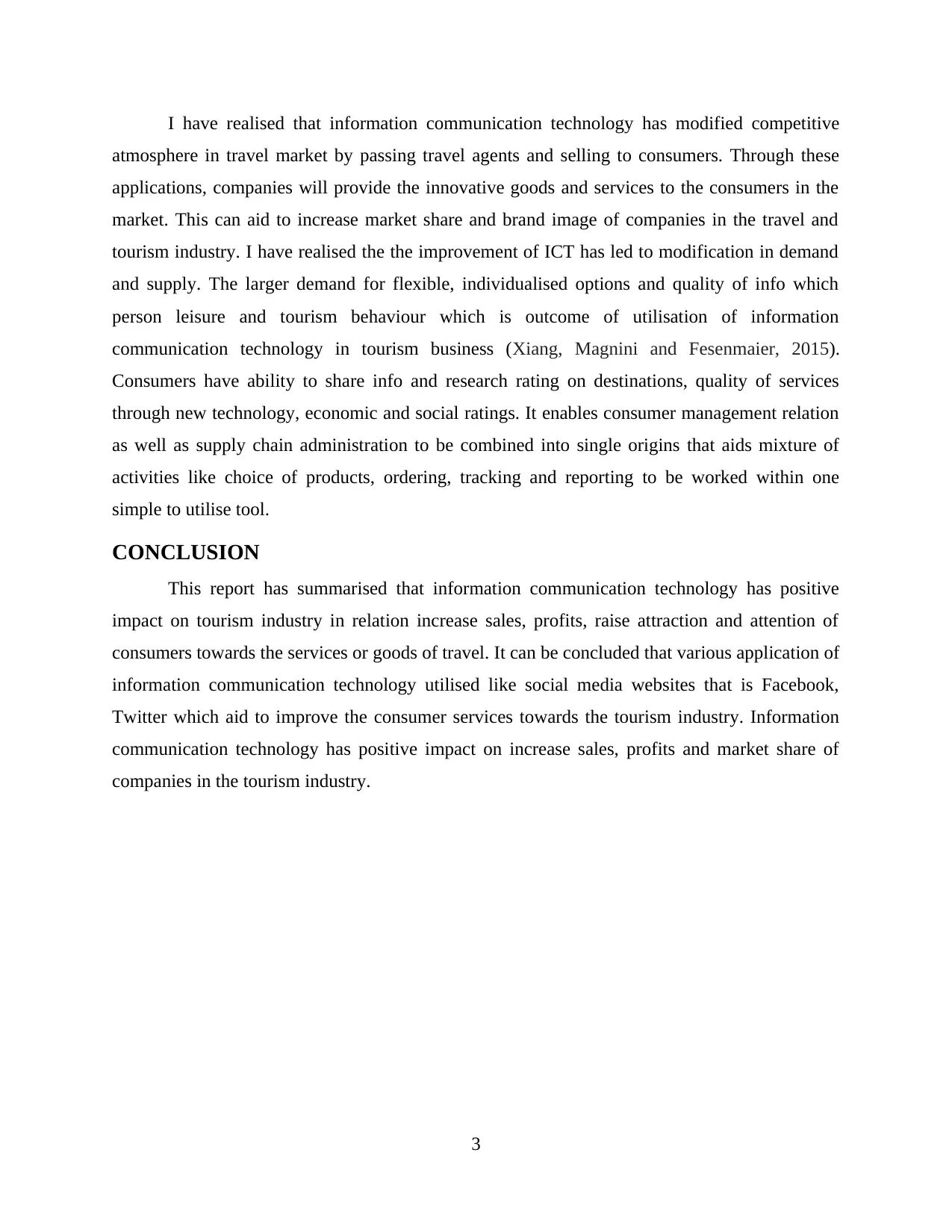
I have realised that information communication technology has modified competitive
atmosphere in travel market by passing travel agents and selling to consumers. Through these
applications, companies will provide the innovative goods and services to the consumers in the
market. This can aid to increase market share and brand image of companies in the travel and
tourism industry. I have realised the the improvement of ICT has led to modification in demand
and supply. The larger demand for flexible, individualised options and quality of info which
person leisure and tourism behaviour which is outcome of utilisation of information
communication technology in tourism business (Xiang, Magnini and Fesenmaier, 2015).
Consumers have ability to share info and research rating on destinations, quality of services
through new technology, economic and social ratings. It enables consumer management relation
as well as supply chain administration to be combined into single origins that aids mixture of
activities like choice of products, ordering, tracking and reporting to be worked within one
simple to utilise tool.
CONCLUSION
This report has summarised that information communication technology has positive
impact on tourism industry in relation increase sales, profits, raise attraction and attention of
consumers towards the services or goods of travel. It can be concluded that various application of
information communication technology utilised like social media websites that is Facebook,
Twitter which aid to improve the consumer services towards the tourism industry. Information
communication technology has positive impact on increase sales, profits and market share of
companies in the tourism industry.
3
atmosphere in travel market by passing travel agents and selling to consumers. Through these
applications, companies will provide the innovative goods and services to the consumers in the
market. This can aid to increase market share and brand image of companies in the travel and
tourism industry. I have realised the the improvement of ICT has led to modification in demand
and supply. The larger demand for flexible, individualised options and quality of info which
person leisure and tourism behaviour which is outcome of utilisation of information
communication technology in tourism business (Xiang, Magnini and Fesenmaier, 2015).
Consumers have ability to share info and research rating on destinations, quality of services
through new technology, economic and social ratings. It enables consumer management relation
as well as supply chain administration to be combined into single origins that aids mixture of
activities like choice of products, ordering, tracking and reporting to be worked within one
simple to utilise tool.
CONCLUSION
This report has summarised that information communication technology has positive
impact on tourism industry in relation increase sales, profits, raise attraction and attention of
consumers towards the services or goods of travel. It can be concluded that various application of
information communication technology utilised like social media websites that is Facebook,
Twitter which aid to improve the consumer services towards the tourism industry. Information
communication technology has positive impact on increase sales, profits and market share of
companies in the tourism industry.
3
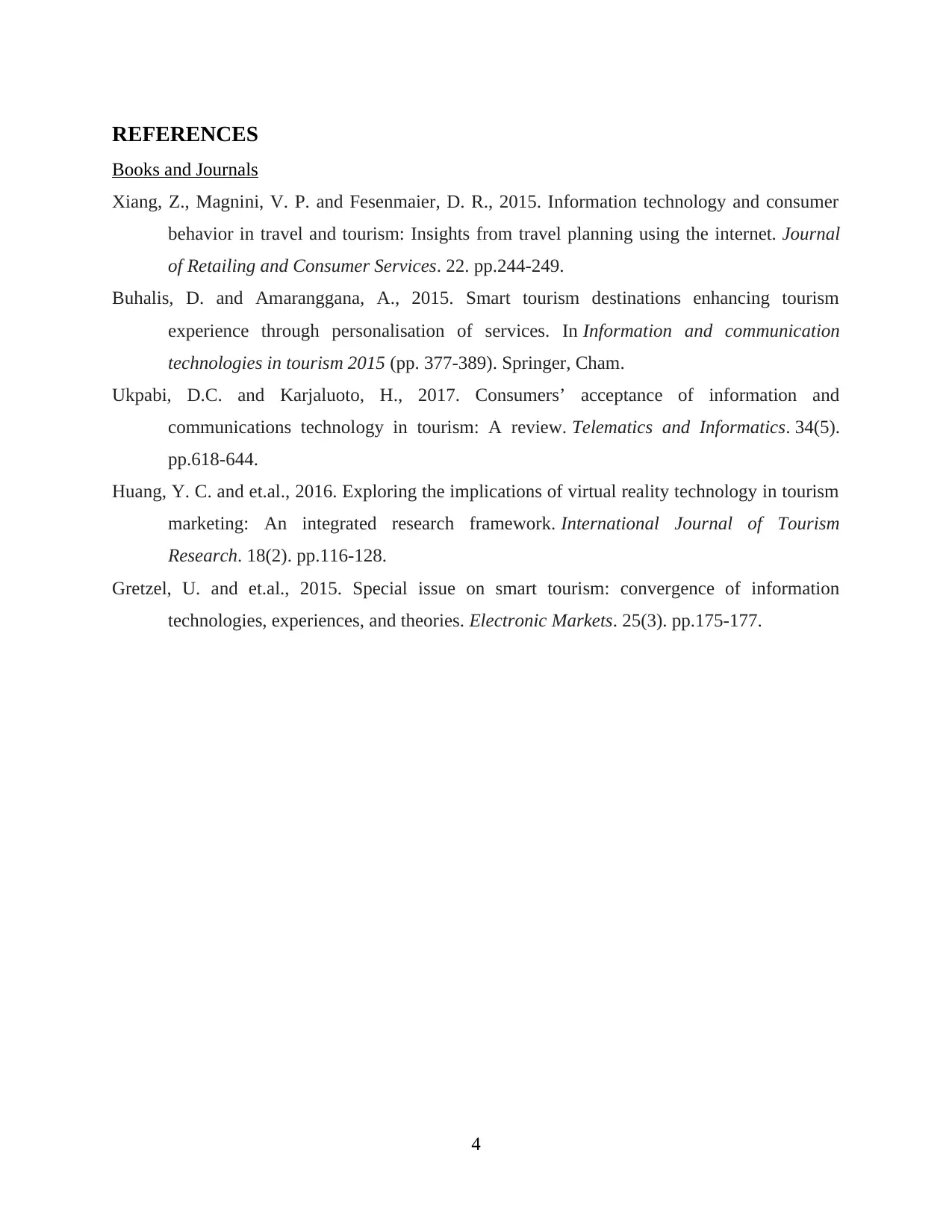
REFERENCES
Books and Journals
Xiang, Z., Magnini, V. P. and Fesenmaier, D. R., 2015. Information technology and consumer
behavior in travel and tourism: Insights from travel planning using the internet. Journal
of Retailing and Consumer Services. 22. pp.244-249.
Buhalis, D. and Amaranggana, A., 2015. Smart tourism destinations enhancing tourism
experience through personalisation of services. In Information and communication
technologies in tourism 2015 (pp. 377-389). Springer, Cham.
Ukpabi, D.C. and Karjaluoto, H., 2017. Consumers’ acceptance of information and
communications technology in tourism: A review. Telematics and Informatics. 34(5).
pp.618-644.
Huang, Y. C. and et.al., 2016. Exploring the implications of virtual reality technology in tourism
marketing: An integrated research framework. International Journal of Tourism
Research. 18(2). pp.116-128.
Gretzel, U. and et.al., 2015. Special issue on smart tourism: convergence of information
technologies, experiences, and theories. Electronic Markets. 25(3). pp.175-177.
4
Books and Journals
Xiang, Z., Magnini, V. P. and Fesenmaier, D. R., 2015. Information technology and consumer
behavior in travel and tourism: Insights from travel planning using the internet. Journal
of Retailing and Consumer Services. 22. pp.244-249.
Buhalis, D. and Amaranggana, A., 2015. Smart tourism destinations enhancing tourism
experience through personalisation of services. In Information and communication
technologies in tourism 2015 (pp. 377-389). Springer, Cham.
Ukpabi, D.C. and Karjaluoto, H., 2017. Consumers’ acceptance of information and
communications technology in tourism: A review. Telematics and Informatics. 34(5).
pp.618-644.
Huang, Y. C. and et.al., 2016. Exploring the implications of virtual reality technology in tourism
marketing: An integrated research framework. International Journal of Tourism
Research. 18(2). pp.116-128.
Gretzel, U. and et.al., 2015. Special issue on smart tourism: convergence of information
technologies, experiences, and theories. Electronic Markets. 25(3). pp.175-177.
4
⊘ This is a preview!⊘
Do you want full access?
Subscribe today to unlock all pages.

Trusted by 1+ million students worldwide
1 out of 6
Related Documents
Your All-in-One AI-Powered Toolkit for Academic Success.
+13062052269
info@desklib.com
Available 24*7 on WhatsApp / Email
![[object Object]](/_next/static/media/star-bottom.7253800d.svg)
Unlock your academic potential
Copyright © 2020–2025 A2Z Services. All Rights Reserved. Developed and managed by ZUCOL.




